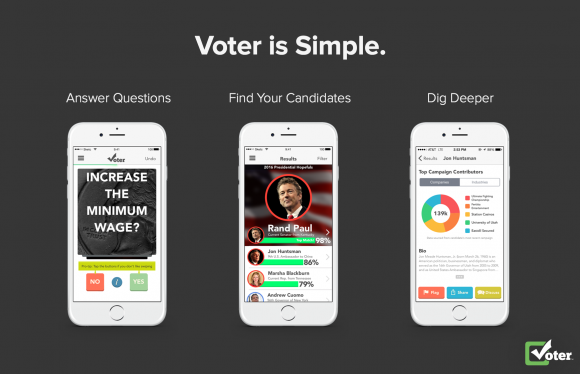Swipe Right For Your Next Presidential Candidate
November 16, 2015
Tinder breaks dating down into its simplest form: you get a brief snapshot of a person, what they like, what they don’t, how they look, where they are located, and make a quick decision as to whether to swipe left (thanks, but not for me) or swipe right (hey, maybe something can come out of this). If only the rest of our lives were that easy.
Well, when it comes to picking a political candidate, it can be with
Voter, a matchmaking app for politics
. Created by Hunter Scarborough (BA/Public Relations & Advertising ’12), the app makes it easy for everyone to vote with confidence. You simply answer a few questions to find out which candidates line up with your own views (and actually have the track record to back it up) to find your perfect political match.
The genesis of the app came out of a place that I feel most of us are in during the political season.
“During the 2012 presidential race, I became frustrated by how difficult it was to find political news sources I could trust,” said Scarborough. “I looked at the wealth of raw political data becoming available, and realized there could be a much faster and more accurate way to become informed.”
Scarborough wanted to mimic online dating, since in some ways, the two topics are similar. He liked Tinder’s swiping interface, and thought it would lend itself to political issues as well as being fast, fun, and easy to use.

He also felt like he needed something like this to help researching the candidates, as doing it on your own can be a long, frustrating process these days.
“As I researched the potential market, I found I wasn’t alone in my disappointment with the current system; people are more disenfranchised than ever. The 2014 midterm elections saw the lowest voter turnout in 72 years, at only 36%,” Scarborough said.
The app has been in development for nearly a year and half. In early 2014, after designing a basic prototype of Voter, Scarborough began looking for a talented developer, but after several interviews, had not found anyone that met every requirement.
A chance meeting over dinner at his cousin’s house led him to his cousin’s roommate, Sonny, an engineer at Yahoo. A week later, the two of them dove into building what would become their first beta.
After getting feedback from friends and family, Scarborough went a step further and validated the product through beta testing and surveys. Their final test flight group came to just over 500 beta testers.
“Over three months of surveys and testing, the response was a resounding, ‘Yes. I need this. The country needs this,’” said Scarborough.
The app launched on September 17, 2015, and as of November 7, has over 36,000 active users.
The behind the scenes side of the app is pretty interesting as well. As mentioned, a lot of research goes into the candidates, and they make sure everything is up to date.
“To ensure the highest level of accuracy, we hold politicians accountable to their actions, analyzing candidates’ voting records, public agenda, personal views, speeches, and more,” said Scarborough. “We present this information as a percentage, describing how closely your views align with each candidate.”
Initially, they were planning to analyze voting records for congressional bills, however, they quickly realized that bills were far too broad to sum up with a binary question.
“We were searching for a solution when we realized that amendments, the smaller items that make up the bills, had voting records attached to them as well. We now have a greater number of data points, and each point is significantly more accurate. This all translates into more accurate matching and a better experience for a user.”
At the end of the day, though, their mission is to take the friction out of becoming an informed voter.
“Uninformed voters don’t vote, or worse, they do,” said Scarborough. The app helps takes out much of that guesswork. There is also bias in the news and media, which Voter helps do away with. On top of that, most millennials, and younger, get their news from social networking apps, and nowhere else. This puts Voter in a prime spot to help inform them of what they are voting for.
When asked how his time at Dodge College helped during Voter’s development, it came as no surprise that it contributed in a few ways.
“Having been a PRA major, and film studies minor, I found myself drawing on all my experiences at Chapman to make the promotional video we did for Voter come to life,” said Scarborough.
“More importantly, though, my time studying advertising gave me a great appreciation for the item that separates the good ad campaigns from the great ad campaigns: empathy. Empathy is the driving force behind successful products, and it is also the driving force behind successful advertising. Dodge’s ad program engrained in me the power of empathy, what it means to step into a customer’s shoes.”


